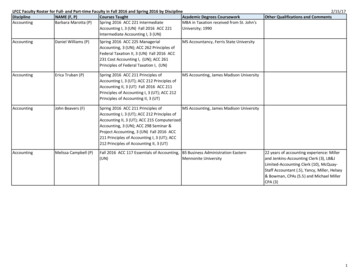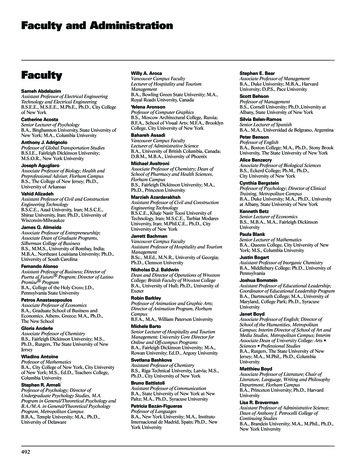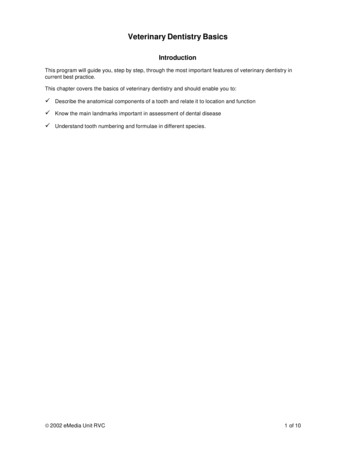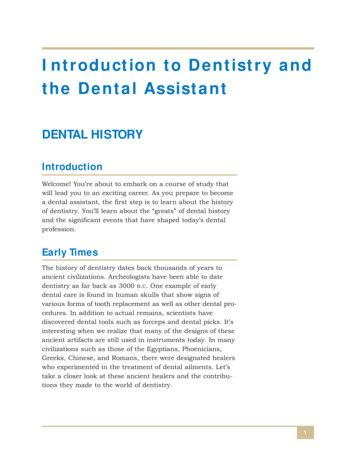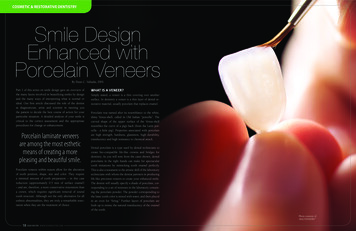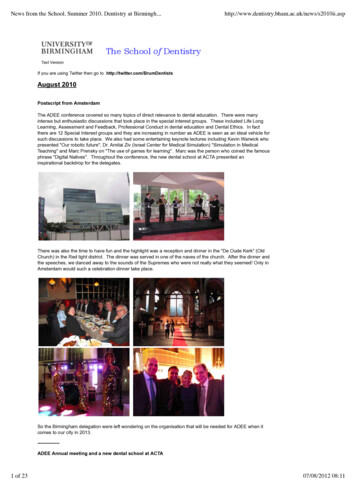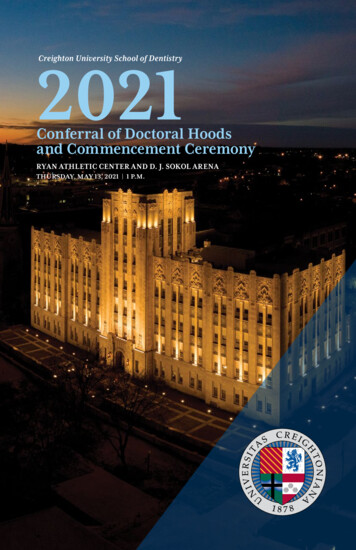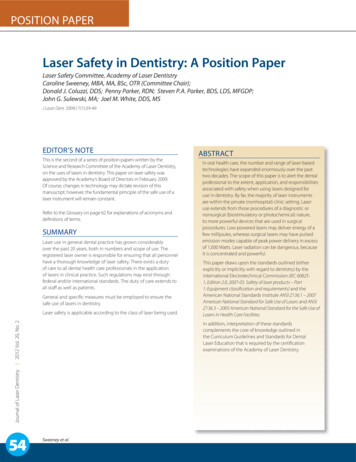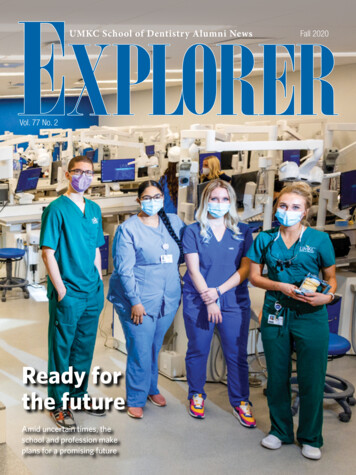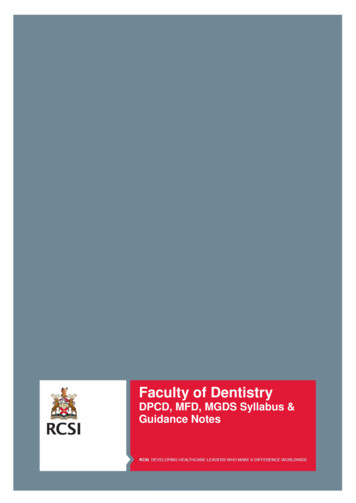
Transcription
Faculty of DentistryDPCD, MFD, MGDS Syllabus &Guidance Notes1
ContentsDiploma of Primary Care DentistryThe SyllabusLearning OutcomesLearning Outcomes Cont.Membership of the Faculty of DentistrySyllabusMembership in General Dental SurgeryScope of Examination2335616162222
Diploma of Primary Care DentistryThe SyllabusCandidates are strongly advised to read the regulations and the appendices in full to appreciate thepractical applications of the syllabus including the guidance blueprint, learning outcomes and themethods of assessments.1. Clinical SkillsRestorative Dentistry (Prosthodontics, Periodontics, Endodontics and a basicknowledge of Implant Dentistry)1.2.Preventive Dentistry (integrating the concept of active disease prevention intoPrimary Care Dentistry including preventive care in relation to caries, periodontaldisease, tooth surface loss, diagnosis and planning of appropriate non-operativeand operative care and dental health education)1.3.Paediatric Dentistry1.4.Special Care Dentistry1.5.Oral Surgery and Oral Medicine relevant to Primary Dental Care1.6.Orthodontics relevant to Primary Dental Care1.7.Biomaterials1.8.Therapeutics relevant to Dentistry (including Anaesthesia and Sedation)1.9.Diagnostic Skills including Radiology1.10. Clinical applications of relevant biological sciences in relation to the practice ofdentistry1.11. Evaluation of Scientific Literature relevant to Primary Dental Care1.1.2. Para-clinical Skills(including the five Core CPD areas* as defined by the Dental .11.3 PageThe concept of integrated patient careInfection Prevention and Control*Radiology and Radiation Protection*Clinical Record KeepingTeamwork in delivering patient careRisk Management and Communication Skills including the handling ofComplaints*Ethical and Legal issues in the practice of Dentistry*Governance and Clinical Audit (maintaining standards and complying with therelevant clinical governance requirements)Medical Emergencies*Behavioural Science and patient management issuesDental Public Health relevant to Primary Dental Care
This Syllabus is provided to indicate the areas of knowledge which are expected ofcandidates. It is not intended to be prescriptive or to exclude other topics which areof similar relevance.4 Page
Diploma of Primary Care DentistryLearning OutcomesThe learning outcomes are provided as a guide to assist candidates and training providers in the design andimplementation of training and the delivery of courses. The learning outcomes are cross referenced to thesyllabus.Three key phrases are used to describe the respective learning outcomes which candidates are expected tobe able to know / understand / demonstrate after completing their learning in preparation for theexamination. They are as follows:1.“To Know”means to be aware of through observations, inquiries or information, in orderto acquire knowledge concerning the subject; to be able to describe and explain thesubject area and to outline its applications.2.“To Understand” means to be able to perceive the appropriate “know how” in relation to thesignificance and cause concerning the subject; be able to describe, explain and meaningfullyrelate the subject to the overall area in question.3.“To Demonstrate” means the competency to be able to do, show and explain clearly anddeliberately by reasoning or adducing evidence to establish the validity of the particular area ofknowledge through its applications.5 Page
Diploma of Primary Care DentistryLearning Outcomes Cont.1. Clinical skillsGeneral Restorative Dentistry (Reference to syllabus 1.1, 1.2, 1.4, 1.7)On successful completion of this module, the student will be able to: Demonstrate an effective contemporary understanding of the aetiologies andmanagement of dental caries Demonstrate the way in which dental caries is assessed and managed Provide the evidence base for the different management strategies for dental cariestaking into account of the patient’s diet, use of fluoride and their general relationshipwith restorative dental treatment Explain and apply the theories underpinning dental plaque, its formation, compositionand metabolism( Demonstrate an understanding of the mechanism of tooth surface loss in relation toattrition, abrasion, erosion and abfraction Demonstrate the practical applications of functional occlusion in clinical practice Demonstrate an understanding of temporo-mandibular-dysfunction, particularly inrelation to diagnosis and clinical management Demonstrate an understanding of the applications of adhesive dentistryProsthodontics (Reference to syllabus 1.1)On successful completion of this module, the student will be able to: Demonstrate an understanding and the effective application of clinical skills required forthe management of dental caries Demonstrate an understanding and the clinical skills required in respect of theassessment and management of non-carious tooth surface loss Demonstrate an understanding of the clinical skills required to manage toothdiscolouration and the use of bleaching in clinical dentistry Demonstrate a comprehensive understanding of the clinical skills required for effectiverestorative treatment planning Demonstrate an understanding of the clinical skills required to maintain effectivefunctional occlusion in fixed and removable prostheses Demonstrate an understanding of the clinical skills required to effectively prescribe,design, prepare, construct, fit and maintain complete and partial dentures Demonstrate an understanding of the principles of implant based restorations and beable to discuss their clinical applications and limitationsPeriodontics (Reference to syllabus 1.1)On successful completion of this module, the student will be able to: Demonstrate an understanding of and the appropriate skills for, periodontal examinationand the diagnosis of periodontal disease Demonstrate knowledge in relation to the pathogenesis of periodontal disease, the useand limitations of mechanical and chemical means of plaque control, and the use andlimitations of other therapeutic agents in the control of periodontal disease Demonstrate an understanding of the principles and applications of basic surgical6 Page
periodontal treatment, including the general principles of crown lengthening surgery inrelation to the preservation and restoration of teeth Demonstrate an understanding of the evidence -based clinical principles of regenerativeperiodontal surgery Demonstrate an understanding of the aetiologies and management of periodontaldisease in children and young adults, and the periodontal- systemic disease interface. Demonstrate an understanding of the anatomical principles underpinning the clinicalsignificance of the periodontal -endodontic interface and be able to demonstrate theclinical acumen to properly manage these lesions, where appropriate. Demonstrate an understanding of the general principles of the surgical aspects of dentalimplant placement and be able to apply these principles in appropriate advice andreferral of the patient Demonstrate an understanding of the general principles of soft and hard tissue graftingand be able to explain when these clinical techniques will be applicable to patient careEndodontics (Reference to syllabus 1.1)On successful completion of this module, the student will be able to: Demonstrate a comprehensive understanding of the skills in relation to endodonticdiagnosis, indications and contraindications for endodontic treatment including theclinical management of traumatised teeth Demonstrate an evidence-based knowledge of pulpal and periapical pathology includingtheir relevant clinical applications, including the knowledge and understanding of rootcanal anatomy, access to root canal system and the endodontic periodontic interface Demonstrate the appropriate understanding of the skills where applicable, in relation toendodontic treatment and re-treatment procedures, endodontic preparation andobturation techniques, surgical approach to endodontics and the implications of theendodontic implant interfacePreventive Dentistry (Reference to syllabus 1.2)On successful completion of this module, the student will be able to: Demonstrate an understanding of, and be able to apply the skills in relation to proactivedisease prevention in primary care dentistry, including preventive care in relation todental caries and periodontal disease, preventive care in relation to tooth surface lossand the application of epidemiological techniques in respect of dental and oral disease Demonstrate the understanding and the skills required to carry out an effective oralhealth and risk assessment, including the impact of general health on oral health Demonstrate an understanding of the skills of preventive dentistry including the use offluorides and Oral Health EducationPaediatric Dentistry (Reference to syllabus 1.3)On successful completion of this module, the student will be able to: Demonstrate an understanding of and provide the evidence base for childhood oralhealthcare and prevention, including the appropriate use of fluoride therapy.Demonstrate an understanding of the behaviour management of children in the dentalsettingDemonstrate an understanding of the effective management of the developing dentitionDemonstrate an understanding of, and be able to appropriately identify and refer7 Page
patients for, sedation and general anaesthesia in accordance with contemporary goodpractice guidelinesDemonstrate an understanding of treatment planning including the acumen in relation todiagnosis , pulp therapy in the primary dentition, space maintenance following thepremature loss of any number of deciduous teeth including space maintenanceDemonstrate knowledge and the clinical skills required for the management of dentaltrauma in childrenDemonstrate knowledge of the underlying principles and contemporary good practice inrelation to consent and the paediatric patient, child protection issues and the ethical andlegal implications.Demonstrate knowledge of the management of dental developmental anomalies inchildrenSpecial Care Dentistry (Reference to syllabus 1.4)On successful completion of this module, the student will be able to: Demonstrate an understanding of the management of the oral health, whereappropriate, of patients with intellectual disability, or who are affected by other medical,physical or psychiatric issues, a history of substance misuse and other vulnerable adults. Explain the process for appropriate referral and co-ordination of the care of thesepatients Identify barriers to dental attendance for these patients in a primary care setting and beaware of the challenges in access to dental care for these patients Demonstrate an understanding of how to maintain and preserve the dignities of thesepatients Demonstrate an understanding of the issues of consent/assent, for patients withdisabilities and be able to demonstrate how this process should work in practice Have knowledge of how intellectual, physical, medical and sensory disabilities can affectoral health care delivery and the practical methods these barriers can be alleviatedOral Surgery and Oral Medicine relevant to Primary Dental Care (Reference to syllabus 1.5)On successful completion of this module, the student will be able to: Demonstrate an understanding of, the basic principles of management required for theassessment and diagnosis of the oral hard and soft tissue lesions in a primary dental careenvironmentDemonstrate an understanding and the clinical skills required in relation to non-surgicaland surgical tooth extractions, the potential complications and the treatment of dentoalveolar trauma, in a primary dental care environmentDemonstrate an understanding of the appropriate referral of patients for specialist carein accordance with good practice protocolsDemonstrate an understanding of the diseases of the oral mucosa, including infections,swellings, pigmentation, ulceration, dermatoses, pre-cancerous lesions and neoplasm,including the presentations of squamous and basal cell carcinomas as well as theprinciples of clinical managementDemonstrate knowledge of the diseases of the salivary glands , including functional,infective, autoimmune and neoplastic diseases and an outline of the principles of clinicalmanagement8 Page
Demonstrate an understanding of the diseases of the bone and the jaws, includingodontogenic cysts, tumours, fibro-osseous lesions, endocrine and metabolic disorders Demonstrate knowledge of the orofacial manifestations of systemic diseases includingthe metabolic consequences of trauma and surgery Explain trauma in relation to dento-alveolar trauma, mid-face trauma, mandibularfracture and zygomatic fracture, and be able to demonstrate an understanding of theappropriate referral protocols Demonstrate knowledge of the surgical aspects of implant dentistry including thediagnosis, treatment planning, augmentation of bone and how to make an appropriatereferralOrthodontics relevant to Primary Dental Care (Reference to syllabus 1.6)On successful completion of this module, the student will be able to: Demonstrate an understanding of the management of the developing dentition, includingthe aetiology of malocclusion , diagnosis and treatment planning Demonstrate an understanding of the application of common removable, fixed andfunctional orthodontic appliances, their indications and the underpinning techniquesused in the management of malocclusion, including the clinical indications of InterceptiveOrthodontics Demonstrate knowledge of the orthodontic/restorative/surgical interface Demonstrate an understanding of the duty of care that primary care dentists have in themanagement of malocclusion including the making the appropriate referralsBiomaterials (Reference to syllabus 1.7)On successful completion of this module, the student will be able to: Demonstrate an understandi
Preventive Dentistry (integrating the concept of active disease prevention into Primary Care Dentistry including preventive care in relation to caries, periodontal disease, tooth surface loss, diagnosis and planning of appropriate non-operative and operative care and dental health education) 1.3. Paediatric Dentistry 1.4. Special Care Dentistry 1.5. Oral Surgery and Oral Medicine relevant to .
